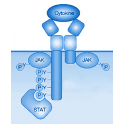
- Remove this product from my favorite's list.
- Add this product to my list of favorites.
Products
Newsletter
 |  |  |  |  |  |

Background
Transforming growth factor beta 1 ( TGFB1) is also known as TGF-β1, CED, DPD1, TGFB. is a polypeptide member of the transforming growth factor beta superfamily of cytokines. It is a secreted protein that performs many cellular functions, including the control of cell growth, cell proliferation, cell differentiation and apoptosis.[1] The TGFB1 protein helps control the growth and division (proliferation) of cells, the process by which cells mature to carry out specific functions (differentiation), cell movement (motility), and the self-destruction of cells (apoptosis). The TGFB1 protein is found throughout the body and plays a role in development before birth, the formation of blood vessels, the regulation of muscle tissue and body fat development, wound healing, and immune system function. TGFB1 is particularly abundant in tissues that make up the skeleton, where it helps regulate bone growth, and in the intricate lattice that forms in the spaces between cells (the extracellular matrix). Within cells, this protein is turned off (inactive) until it receives a chemical signal to become active.[2-3] TGFB1 plays an important role in controlling the immune system, and shows different activities on different types of cell, or cells at different developmental stages. Most immune cells (or leukocytes) secrete TGFB1. [4] TGFB1 has been shown to interact with TGF beta receptor 1, LTBP1, YWHAE, EIF3I and Decorin.
Source
Recombinant Human TGFB1, premium grade(TG1-H4212) is expressed from human 293 cells (HEK293). It contains AA Ala 279 - Ser 390 (Accession # P01137-1).
Predicted N-terminus: Ala 279
It is produced under our rigorous quality control system that incorporates a comprehensive set of tests including sterility and endotoxin tests. Product performance is carefully validated and tested for compatibility for cell culture use or any other applications in the early preclinical stage. When ready to transition into later clinical phases, we also offer a custom GMP protein service that tailors to your needs. We will work with you to customize and develop a GMP-grade product in accordance with your requests that also meets the requirements for raw and ancillary materials use in cell manufacturing of cell-based therapies.
Molecular Characterization
This protein carries no "tag".
The protein has a calculated MW of 12.8 kDa (monomer). The protein migrates as 14 kDa (monomer) under reducing (R) condition, and 25 kDa (Dimer) when calibrated against Star Ribbon Pre-stained Protein Marker under non-reducing (NR) condition (SDS-PAGE).
Endotoxin
Less than 0.1 EU per μg by the LAL method.
Host Cell Protein
<0.5 ng/μg of protein tested by ELISA.
Host Cell DNA
<0.02 ng/μg of protein tested by qPCR.
Sterility
The sterility testing was performed by membrane filtration method.
Mycoplasma
Negative
Purity
>95% as determined by SDS-PAGE.
Formulation
Lyophilized from 0.22 μm filtered solution in 0.085% TFA in 30% ACN with trehalose as protectant.
Reconstitution
Please see Certificate of Analysis for specific instructions.
For best performance, we strongly recommend you to follow the reconstitution protocol provided in the CoA.
Storage
For long term storage, the product should be stored at lyophilized state at -20°C or lower.
Please avoid repeated freeze-thaw cycles.
This product is stable after storage at:
-20°C to -70°C for 12 months in lyophilized state;
-70°C for 12 months under sterile conditions after reconstitution.
Bioactivity
Please refer to product data sheet.
(1) "Targeted inhibition of transforming growth factor-β type I receptor by AZ12601011 improves paraquat poisoning-induced multiple organ fibrosis"
Zhang, Yang, Liu et al
Pestic Biochem Physiol (2024) 200, 105831
(2) "Loureirin B ameliorates cholestatic liver fibrosis via AKT/mTOR/ATG7-mediated autophagy of hepatic stellate cells"
Cheng, Zeng, Cheng et al
Eur J Pharmacol (2024) 971, 176552
(3) "Low TGF-β1 plasma levels are associated with cognitive decline in Down syndrome"
Grasso, Fidilio, L'Episcopo et al
Front Pharmacol (2024) 15, 1379965
Showing 1-3 of 42185 papers.
Follow us